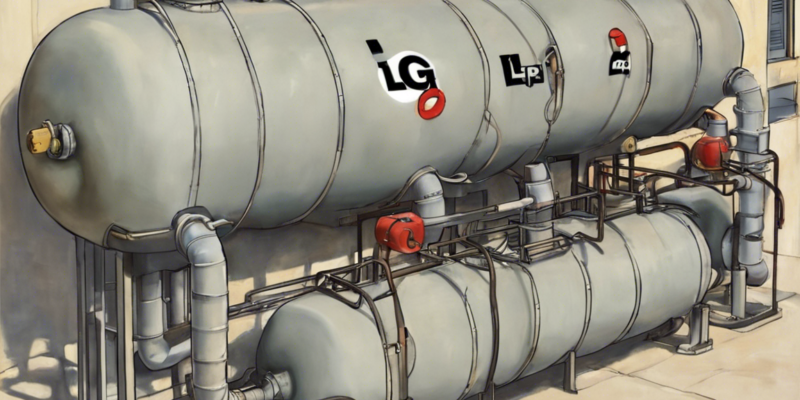LPG Full Form: What Does LPG Stand For?
LPG stands for Liquefied Petroleum Gas. It is a common term used to describe a group of hydrocarbon gases, primarily propane and butane, that are liquefied through pressurization for ease of storage and transportation. LPG is a versatile energy source with a wide range of applications in residential, commercial, and industrial settings. In this article, we will delve deeper into the world of LPG, exploring its composition, characteristics, uses, benefits, and safety considerations.
Composition of LPG
LPG is primarily composed of two gases: propane and butane. Propane, also known as C3H8, is a three-carbon alkane gas with the molecular formula C3H8. It is a colorless and odorless gas in its natural state but is odorized for easy detection in case of leaks. Butane, on the other hand, is a four-carbon alkane with the molecular formula C4H10. Like propane, butane is also odorized to aid in leak detection.
Characteristics of LPG
1. Odorless: While propane and butane are odorless in their natural state, an odorant called mercaptan is added to LPG as a safety measure. Mercaptan gives LPG its distinctive, unpleasant smell, making it easier to detect in case of leaks.
2. High Energy Content: LPG has a high energy content per unit volume, making it an efficient and cost-effective fuel source for various applications.
3. Versatility: LPG can be used for a wide range of purposes, including heating, cooking, transportation, and power generation.
4. Clean Burning: LPG burns cleanly with lower emissions compared to other fossil fuels, making it a more environmentally friendly energy option.
Uses of LPG
LPG has numerous applications across different sectors, some of which include:
-
Residential Use: LPG is commonly used for cooking, heating water, and space heating in households that do not have access to natural gas.
-
Commercial Use: Many businesses use LPG for heating, cooling, cooking, and powering equipment.
-
Industrial Use: LPG is widely utilized in industries for processes such as heating, cutting, welding, and powering industrial ovens.
-
Transportation: LPG is used as an alternative fuel for vehicles, offering reduced emissions and cost savings compared to traditional gasoline and diesel.
Benefits of LPG
LPG offers several advantages as an energy source, including:
-
Efficiency: LPG has a high energy content, which means more energy can be derived from less volume compared to other fuels.
-
Versatility: LPG can be used for a wide range of applications, making it a versatile energy source.
-
Clean Burning: LPG produces lower emissions and pollutants compared to coal and diesel, making it a cleaner fuel option.
-
Cost-Effectiveness: LPG is often more affordable than other energy sources, providing cost savings for consumers and businesses.
Safety Considerations
While LPG is a safe and reliable energy source when handled correctly, it is essential to follow proper safety precautions to prevent accidents. Some safety considerations when using LPG include:
-
Proper Ventilation: Ensure that there is adequate ventilation when using LPG appliances to prevent the buildup of gas indoors.
-
Regular Maintenance: Schedule regular maintenance checks for LPG appliances and storage tanks to detect any leaks or malfunctions early.
-
Proper Storage: Store LPG cylinders in a well-ventilated area away from heat sources and ignition points.
-
Caution with Use: Follow manufacturer instructions when using LPG appliances and never tamper with safety features.
-
Emergency Preparedness: Have a clear understanding of what to do in case of a gas leak or emergency, including how to shut off the gas supply and evacuate safely.
Frequently Asked Questions (FAQs)
1. Is LPG the same as natural gas?
No, LPG (Liquefied Petroleum Gas) is different from natural gas. LPG is a mixture of propane and butane, while natural gas is primarily methane.
2. Can LPG be used for heating purposes?
Yes, LPG is commonly used for heating homes, water, and industrial processes.
3. How is LPG transported and stored?
LPG is transported and stored in pressurized containers, such as cylinders or tanks, to keep it in its liquefied state.
4. Is LPG environmentally friendly?
LPG is considered a cleaner-burning fuel compared to traditional fossil fuels like coal and diesel, resulting in lower emissions and pollutants.
5. What are the potential dangers of using LPG?
The main risks associated with LPG include leaks, fire hazards, and carbon monoxide poisoning if not used or maintained properly.
6. Can LPG be used for cooking purposes?
Yes, LPG is commonly used for cooking in households and commercial kitchens due to its efficiency and clean-burning properties.
7. How do I detect a gas leak in my LPG system?
Gas leaks can be detected by the distinctive, unpleasant odor added to LPG or through the use of gas detectors and alarms.
8. What should I do in case of an LPG leak?
If you suspect an LPG leak, evacuate the area immediately, shut off the gas supply if safe to do so, and contact emergency services for assistance.
9. Can LPG be used for automotive purposes?
Yes, LPG is used as an alternative fuel for vehicles, offering reduced emissions and cost savings compared to traditional gasoline and diesel.
10. Are there any government regulations regarding the use of LPG?
Yes, there are government regulations and safety standards in place to govern the handling, storage, and use of LPG to ensure public safety and environmental protection.
In conclusion, LPG (Liquefied Petroleum Gas) is a versatile and efficient energy source with a wide range of applications in residential, commercial, and industrial settings. By understanding its composition, characteristics, uses, benefits, and safety considerations, users can maximize the advantages of LPG while ensuring safe and responsible usage.

